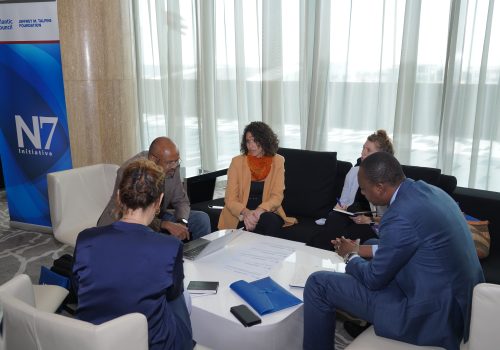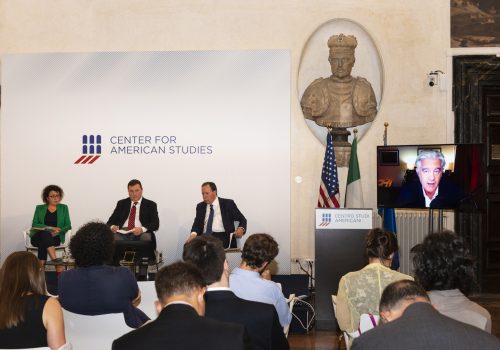How expanding the QIZs can help economic development in the Middle East

When the protocol on the Qualified Industrial Zones (QIZ) was signed in 2004, the signatories had one main objective: a warmer peace between Egypt and Israel. While the economic gains were compelling, the bridge the QIZ created between the two nations was the real prize.
In its simplest terms, the QIZ is a protocol between the governments of Egypt and Israel that allows the former—the Middle East’s most populated country—to benefit from the free trade agreement Israel enjoys with the United States. Israel, in return, reaps more political gains than economic ones, which are largely limited.
When the protocol was signed nineteen years ago, conducting business deals between Egyptians and Israelis, exchanging visits, and publishing photos of meetings made headlines. It was unwelcome by all Arab countries except Jordan, which had a peace treaty and similar QIZ protocol with Israel. But doing business with the largest Arab country gave Israel the recognition it sought in the region, helping to gradually de-stigmatize the idea of trade relations with Israel for other Arab, African, and regional countries.
To qualify for duty-free exports to the US, products must be manufactured in select zones designated by Egyptian and Israeli authorities, with final approval provided by the US government. Additional conditions for products imported from the QIZ zones necessitate that the total cost of the material produced and the direct cost of a processing operation performed must not be less than 35 percent of the appraised value. Additionally, goods must contain an Israeli input of 10.5 percent of the product, which is expected to be reduced in the coming weeks as part of a pending agreement that I am privy to.
While this may seem like a list of qualifying criteria, the reality is that the QIZ is a unique program that exceeds some of the most preferential agreements that the US has with other countries.
Most trade agreements are based on the idea of the exchange of benefits. Essentially, markets are open to one another. The QIZ, however, is built on a beneficial partnership. Products made in a QIZ must be made only through working partners. A manufacturer in Egypt cannot do it alone unless he has a partner in Israel who provides them with an additional component made in Israel. Subsequently, an Israeli producer working in this program cannot ship their product unless it is through a partner in Egypt. Ultimately, an American importer receives the merchandise, which is exempted from duties. This is an advantage for them and, more importantly, for the US consumer.
Another reason why this program is different is that it is indefinite. Unlike many other agreements that require a renewal process (whether annually or every few years), the QIZ protocol removes any doubt of renewal. This is significantly different than the Generalized System of Preferences (GSP), for instance. With GSP, the uncertainty of whether the agreement will be renewed troubles the business world and global economies annually. The oft-repeated questions as to whether a US administration or Congress will approve it again has stunted the agreement’s ability to flourish as intended. Many similar programs or agreements face uncertainty that negatively affects and confuses the beneficiaries. The QIZ, on the other hand, is stable and immutable.
Additionally, while most Free Trade Agreements (FTAs) focus on economic aspects of cooperation, the QIZ also has essential socio-political aspects:
- It has flexible rules of origin in comparison to some FTAs, allowing, for instance, imported fabrics to be cut and sewn in Egypt.
- It is an evolving program and new zones are continuously added. Additionally, there is renewed flexibility on the inclusion of new mills.
- Political support for the program is very strong across all governments. The US administration considers it one of the most preferential programs ever made, with consistent backing from Congress. Egyptian and Israeli political leadership are likewise always supportive. Even during times of political crisis in Egypt, the program has survived. For example, when a radical regime ruled Egypt a few years ago, the program was never affected.
- QIZ plays a vital role as a catalyst for warm peace in the Middle East.
While the positive impact of the QIZ has been felt across borders, the program’s potential is still underutilized. The most critical example is the program’s attempt to expand the qualifying geographical areas under the QIZ. This demand was raised formally on March 30, 2022, when the Egyptians and Israelis joined forces to pen a letter signed by ministers from both governments to United States Trade Representative Ambassador Katherine Tai, which I am aware of. Both governments see the value in expanding relations between business communities from Israel and Egypt. As such, the letter requested the expansion of the QIZ protocol as a means “to significantly enhance the opportunity for both countries and to remain forward-looking, particularly in light of new developments in the Middle East.”
To illustrate the desire for this, I recently attended the N7 Conference on Trade in Bahrain, where country representatives strongly and repeatedly voiced support for QIZ expansion.
The two governments’ vision is to add new zones within the underdeveloped areas in southern Egypt. This will not present any potential threat to US industry. On the contrary, it could replace some imports from China and encourage investors to establish new factories in Egypt. The positive impact this will have on the economy, which is already under heavy strain, is immeasurable.
Though the textile industry in Egypt is one of the oldest in the world (going back to the time of the pharaohs), Egypt is comparatively small in relation to other major players in the US market. Per US trade statistics, Egypt has always represented under one percent of US global imports.
On a more personal yet representative level, I was struck by the story of an incredible young woman I met some time ago. Nourhan, who was in her twenties, has a disability and a family of eight with no breadwinner. Sadly, her story is not uncommon in her underprivileged village in southern Egypt. While seeking an income for her family, Nourhan has been turned down for many opportunities. However, a QIZ factory administration was so inspired by her story of strength and perseverance that they decided to give her special training to empower her to work there.
Today, she and her three thousand factory coworkers openly celebrate being employed by an Egyptian-Israeli-American corporation, Delta. The significance of this cannot be overstated. Nourhan’s story sheds a symbolic light on the necessity of expanding the establishment of factories in the remote and under-supported regions of southern Egypt where she and her family live.
Per what I’ve been told, it’s worth noting that 85 percent of the employees in Nourhan’s factory are female. This initiative is unique in southern Egypt, which has traditionally had women stay behind in their homes. This example is just a microcosm of how this type of investment benefits local communities socio-economically and spreads a culture of recognizing peace in the Middle East.
An expansion of the QIZ will significantly grow cooperation among business people and entrepreneurs in Egypt and Israel, along with their American counterparts, and help this essential partnership flourish beyond the current modest level of around one billion US dollars annually. This is why it’s more important than ever that it gets the support it needs.
Ashraf El Rabiey is the team lead of one of the USAID-funded projects in Egypt. He also the former co-chairman of the QIZ Joint Committee between Egypt and Israel.

The N7 Initiative, a partnership between the Atlantic Council and Jeffrey M. Talpins Foundation, seeks to broaden and deepen normalization between Israel and Arab and Muslim countries. It works with governments to produce actionable recommendations to deliver tangible benefits to their peoples.
Further reading
Tue, May 30, 2023
Cross-border cooperation between Israel and MENA region is key to addressing climate change
MENASource By
There are many opportunities to meet climate-related challenges through cooperation, expertise sharing, and the exchange of ideas in MENA.
Thu, Jun 16, 2022
A new transatlantic relationship for the Middle East and North Africa
Event Recap By
On June 7, the Atlantic Council’s (AC) North Africa Initiative hosted an event, “New Transatlantic Relations for the Middle East and North Africa,” in collaboration with US Embassy Rome and Centro Studi Americani. Moderated by Karim Mezran, director of the AC’s North Africa Initiative and resident senior fellow at the Atlantic Council, the event explored […]
Thu, Jan 26, 2023
People-to-people exchanges matter. They’re integral to nurturing the Abraham Accords.
MENASource By Richard LeBaron
This piece identifies some of the issues involved in creating a strong framework for a vital “Abraham Exchanges” program and proposes a few ideas on how to get it off the ground.
Image: Seamstresses work in a factory that makes and exports Valentino men's suits in 10th of Ramadan City, Egypt February 22, 2006. This factory, like many others, is in a Qualified Industrial Zone (QIZ) which was implemented last year in Egypt and has helped to attract more foreign ready-made clothes companies.


